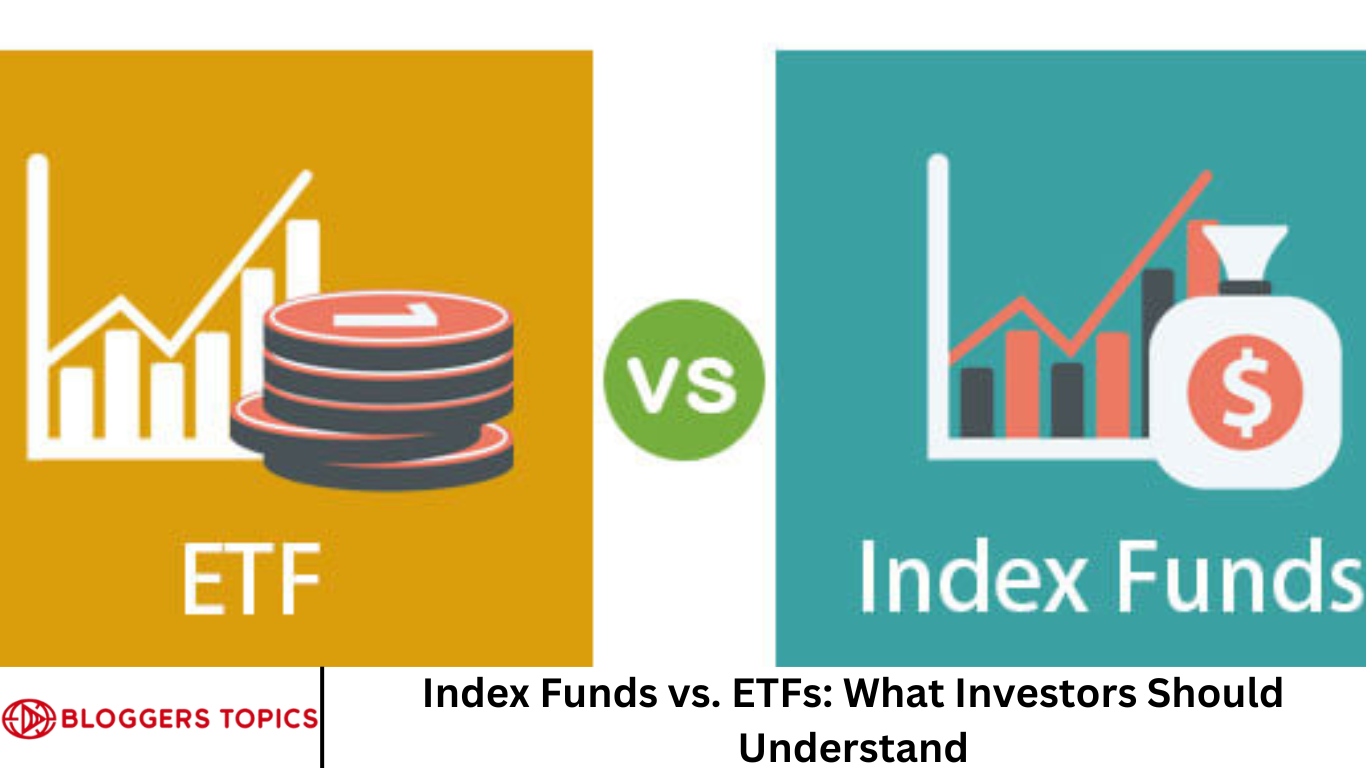Passive investing has surged in popularity, offering investors efficient, low-cost ways to build diversified portfolios. Two of the most common vehicles for passive investing are index funds and exchange-traded funds (ETFs). While they share similarities, understanding their differences is crucial for making informed investment decisions.
More Read: 10 Creative Ways to Turn $100 into $1000
What Are Index Funds and ETFs?
Index Funds
An index fund is a type of mutual fund designed to replicate the performance of a specific market index, such as the S&P 500 or the Nasdaq 100. These funds aim to match the returns of their benchmark index by holding all (or a representative sample) of the securities in that index. Investors buy and sell index fund shares at the fund’s net asset value (NAV), which is calculated at the end of each trading day.
ETFs (Exchange-Traded Funds)
ETFs also aim to track the performance of a specific index. However, unlike index mutual funds, ETFs trade on stock exchanges throughout the trading day at market prices, which can fluctuate based on supply and demand. This intraday trading feature provides investors with greater flexibility.
Key Differences Between Index Funds and ETFs
1. Trading Mechanism
- Index Funds: Transactions occur once per day after the market closes, based on the NAV.
- ETFs: Can be bought and sold throughout the trading day at market prices, similar to individual stocks.
Implication: ETFs offer more flexibility for investors who wish to trade during market hours or employ strategies like intraday trading.
2. Minimum Investment Requirements
- Index Funds: Often have minimum investment thresholds, typically ranging from $500 to $3,000, depending on the fund provider.
- ETFs: Generally have no minimum investment requirement beyond the price of a single share, making them accessible to investors with limited capital.
Implication: ETFs may be more suitable for investors starting with smaller amounts of capital.
3. Expense Ratios and Fees
- Index Funds: Typically have low expense ratios, but they can be slightly higher than those of ETFs.
- ETFs: Often have lower expense ratios compared to index funds.
Implication: Over the long term, lower expense ratios can lead to significant cost savings, potentially enhancing overall returns.
4. Tax Efficiency
- Index Funds: May distribute capital gains to investors, leading to potential tax liabilities.
- ETFs: Structured to minimize capital gains distributions, offering greater tax efficiency.
Implication: ETFs might be more tax-efficient, especially for investors in higher tax brackets.
5. Dividend Reinvestment
- Index Funds: Often offer automatic dividend reinvestment plans, allowing dividends to be reinvested into the fund seamlessly.
- ETFs: Dividend reinvestment depends on the brokerage platform; not all brokers offer automatic reinvestment for ETFs.
Implication: Investors seeking automatic reinvestment of dividends might prefer index funds, depending on their brokerage services.
6. Trading Costs
- Index Funds: Generally do not incur trading commissions when purchased directly from the fund provider.
- ETFs: May incur brokerage commissions, though many platforms now offer commission-free ETF trades.
Implication: While ETFs offer trading flexibility, investors should be aware of potential trading costs, especially if trading frequently.
Advantages and Disadvantages
Index Funds
Advantages:
- Simplicity and ease of use.
- Suitable for long-term, buy-and-hold investors.
- Automatic investment and dividend reinvestment options.
Disadvantages:
- Lack of intraday trading flexibility.
- Potentially higher expense ratios compared to ETFs.
- Less tax-efficient due to capital gains distributions.
ETFs
Advantages:
- Intraday trading capability.
- Lower expense ratios.
- Greater tax efficiency.
- No minimum investment requirements beyond share price.
Disadvantages:
- May incur trading commissions.
- Dividend reinvestment depends on brokerage services.
- Requires a brokerage account to trade.
Which Is Right for You?
The choice between index funds and ETFs depends on your individual investment goals, preferences, and circumstances:
- Choose Index Funds If:
- You prefer a hands-off, long-term investment approach.
- You value automatic investment and dividend reinvestment options.
- You plan to invest consistent amounts regularly.
- Choose ETFs If:
- You desire trading flexibility and intraday pricing.
- You are investing smaller amounts and want to avoid minimum investment thresholds.
- You are in a higher tax bracket and seek tax-efficient investment options.
Frequently Asked Question
What is the main difference between index funds and ETFs?
The primary difference lies in how they are traded. Index funds are mutual funds purchased or sold once per day at the net asset value (NAV), while ETFs trade like stocks on exchanges throughout the day at market prices.
Which is more cost-effective, index funds or ETFs?
ETFs generally have lower expense ratios and are more tax-efficient. However, index funds may be cheaper if you’re investing directly with a provider that offers no trading fees and automatic investing options.
Are ETFs riskier than index funds?
Not inherently. Both typically track a market index, so their risk profile is similar. However, because ETFs trade throughout the day, they may be more tempting for short-term trading, which can increase behavioral risk.
Do both ETFs and index funds pay dividends?
Yes, if the underlying assets pay dividends, both types of funds pass them on to investors. Index funds often reinvest dividends automatically, while ETF reinvestment depends on your brokerage’s policies.
Can I invest small amounts in both?
ETFs are often more accessible for small investments since you can buy a single share with no minimum. Many index funds have minimum investment thresholds, though some providers now offer $0 minimums for certain funds.
Are ETFs better for tax efficiency?
Yes. ETFs use a unique structure called “in-kind redemption,” which helps minimize capital gains distributions, making them more tax-efficient than most index mutual funds.
Which is better for long-term investing?
Both are excellent for long-term investing. The better choice depends on your investing style. Choose index funds for simplicity and automation, or ETFs if you want flexibility, lower fees, and tax advantages.
Conclusion
Both index funds and ETFs offer efficient, low-cost ways to achieve diversified market exposure. Understanding their differences enables you to select the investment vehicle that aligns best with your financial goals and investment strategy. As with any investment decision, consider consulting with a financial advisor to determine the most suitable option for your individual needs.






